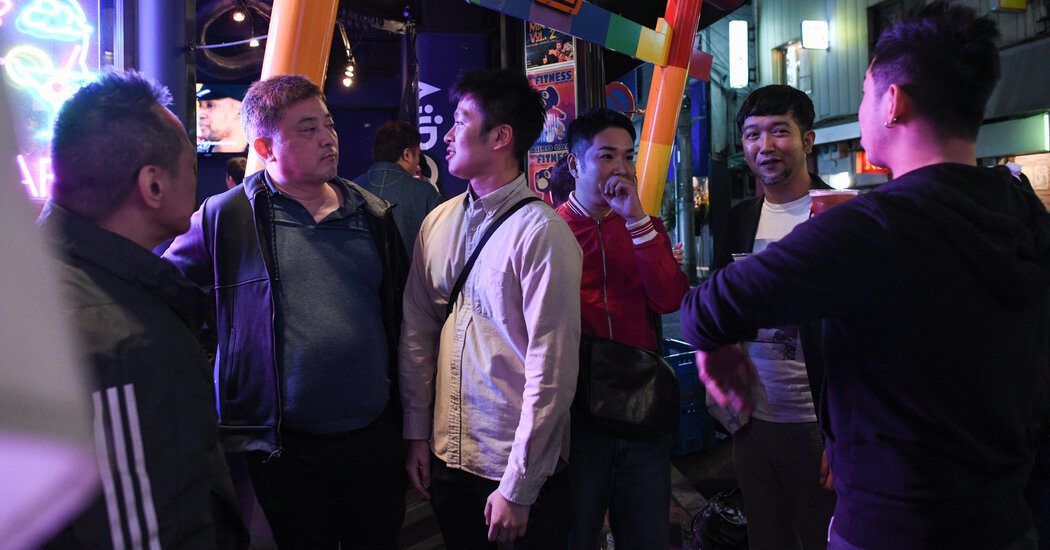Global Courant 2023-05-17 14:00:29
For millions of Japanese, the Shinto faith is not so much a spiritual practice as a cultural one. Every January, crowds gather at shrines to pray for good luck for the new year. Families take their children to celebrate rites of passage, and many seek blessings for happiness in romance, school entrance exams, or job interviews.
Few consider these rituals to be bound by a fixed doctrine – Shintoism, an indigenous religion, has no official dogma or scripture. But unbeknownst to most in largely secular Japan, a national Shinto association has been trying to spread a conservative ideological message to lawmakers, including on gay and transgender rights.
Japan is the only country in the Group of 7 that has not legalized same-sex unions, and foreign ambassadors prompted the country to step up its support for equality ahead of a Hiroshima summit starting later this week. polls show overwhelming support for same-sex marriage in Japan; one of the country’s most influential business leaders recently called it “shameful” that Japan has not sanctioned unions.
Lawmakers, under pressure from the Shinto group and other traditionalist forces, have lagged behind public opinion and struggle to agree on even limited expressions of support for gay and transgender rights.
Last summer, the Shinto organization distributed a 94-page pamphlet at a large meeting for affiliated members of parliament, mainly from the ruling Liberal Democratic Party, which contained a transcript of a lecture describing homosexuality as “an acquired mental disorder, an addiction” which can be remedied with ‘restorative therapy’.
Another transcribed reading opposed the passage of an LGBTQ rights law, claiming that “there is no systematic discrimination” in Japan and warning that “left-wing activists will use this as their weapon” and that there would be “an eruption of lawsuits” .
This week, a Liberal Democrat parliamentary committee approved a modestly worded bill stating that there should be “no unfair discrimination” against LGBTQ people. Activists and opposition party leaders say the bill, which could go before the full parliament while the G7 meets, is weaker than a bill that failed two years ago.
Scholars say behind-the-scenes efforts of the Shinto group — the Shinto Association of Spiritual Leadership, the political arm of an organization that oversees 80,000 shrines — is one reason for the disconnect between the wider society and the political sphere.
Many shrine workers and visitors may not necessarily be aware of, or disagree with, the efforts of the Shinto society to influence government policy.
But conservatives in the governing party “really rely on the religious right for their election campaigns,” said Kazuyoshi Kawasaka, a lecturer in modern Japanese studies at Heinrich Heine University in Düsseldorf, Germany. The influence of such groups “is far more important than the public’s support for same-sex marriage,” Mr Kawasaka said.
Naofumi Ogawa, a lawyer for the Shinto group, said in an email that the pamphlet “does not directly reflect the organization’s views.”
But the group itself has posted documents website calls for “excessive protection of rights” or to legalize same-sex marriage as “movements to dismantle the family structure”.
During an interview with foreign media last month, Prime Minister Fumio Kishida explained why Japan had not yet legalized same-sex marriage. “The situation around each country is different,” he said in a prepared response to a question from The New York Times. “A careful, thorough discussion is needed.”
The influence of the religious right on conservative politicians in Japan remained largely hidden until last year’s assassination of Shinzo Abe, the former prime minister who was shot by a man who harbored a grudge against the fringe religious movement Unification Church.
After Mr. Abe’s death, the Japanese media discovered connections between the church and more than 100 MPs, including the former prime minister, the vast majority of whom are in the governing party.
Unification Church affiliates have also campaigned against gay and transgender rights in Japan. An editorial in the World Daily, a newspaper affiliated with the church, recently stated that the current LGBTQ law “may cause crime” and that “trans women could invade women’s spaces.”
A political affiliate of the Unification Church said it had not lobbied lawmakers on the “LGBT law in particular”, but believed the law “has not been fully discussed and is premature”.
While the Unification Church came under heavy scrutiny after Mr. Abe’s death, the Shinto Association largely operated under the media radar and tried to influence lawmakers on other long-standing social issues.
It has prompted conservatives to enforce a law requiring married couples to choose one surname and prohibiting female heirs from ascending the imperial throne.
With an increasing number of congregations in Japan offering same-sex partnerships and gay couples filing lawsuits declaring unconstitutional the country’s unconstitutional recognition of same-sex marriages, the Shinto society is beginning to feel “deeply threatened by this issue said Tomomi Yamaguchi. , a professor at Montana State University who studies gender and sexuality in Japan.
The sponsor of the LGBTQ bill, Takeshi Iwaya, said he was wary of how the shrine group had meddled in the current debate. “I think they are getting too deep into policy,” said Mr Iwaya, a Liberal Democrat.
Passing the current bill required more moderate Liberal Democrats to spend significant political capital, and some faced serious criticism.
“Every day I get calls asking me to oppose the bill, and the phone just keeps ringing,” said Tomomi Inada, a former defense minister and Liberal Democrat lawmaker who sponsored the bill two years ago. “There is a lot of pressure. People have tried to tarnish my re-election chances.”
Foreign ambassadors, led by US envoy, Rahm Emanuel, have spoken out in support of the current LGBTQ law, as well as same-sex marriage, while pointing to Japanese public support.
“There are right-wing efforts that are quite entrenched, and in my opinion they are above their weight class,” said Emanuel. “You can’t get 70 percent ‘public opinion polls’ without an element of self-proclaimed conservative voters saying we’re pro-gay marriage.”
But political apathy makes it difficult for gay and transgender advocates to recruit allies.
Voters think that “nothing will change, so they are not interested in politics,” said Gon Matsunaka, director of Marriage for All Japan, an advocacy group.
Business leaders argue that Japan needs to align with its international peers to recruit workers from abroad and keep pace economically.
“Japan has insisted that we should be homogeneous,” said Takeshi Niinami, CEO of Suntory, the beverage company, and president of the Japan Association of Corporate Executives. “But now corporates are globalizing much more.”
While more companies are offering equal benefits to same-sex couples, few employees are taking advantage of them. Patrick Jordan, vice president of human resources at Coca-Cola Japan, said he knew only one Japanese employee in an office of nearly 600 employees who identified as gay.
Intolerance of gay relationships or transgender identity in Japan is relatively modern.
During the Tokugawa period, which spanned from the 17th to the mid-19th century, samurai men regularly had same-sex partnerships, said Gary Leupp, author of “Male Colors: The Construction of Homosexuality in Tokugawa Japan.”
Japan stopped criminalizing gay sex long before many Western countries. Both Kabuki and Takarazuka theatrical traditions embrace fluid gender identities, and gay and transgender performers regularly appear on television. There is a thriving gay and transgender nightlife in Tokyo.
Yet gay and transgender people say they continue to lead hidden lives. Kohei Katsuyama, who lives in Tokyo, resigned from the police force because he feared repercussions if he told colleagues about his sexuality.
“I thought if I came out and people found out, it would be game over,” said Mr. Katsuyama, who has cut himself off from his family because he thinks they won’t accept him living with a male partner. “And I think a lot of people still feel that way.”








